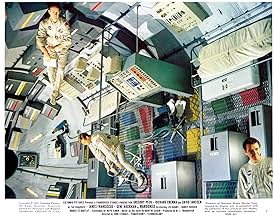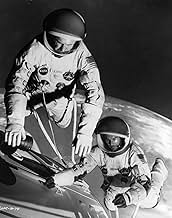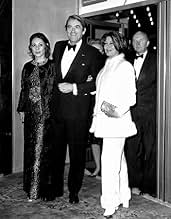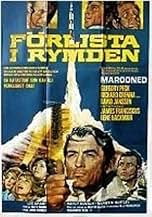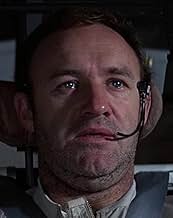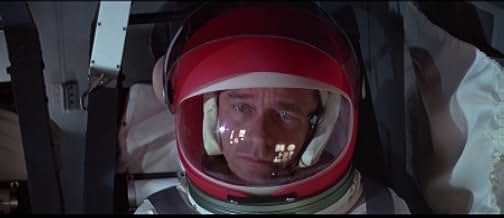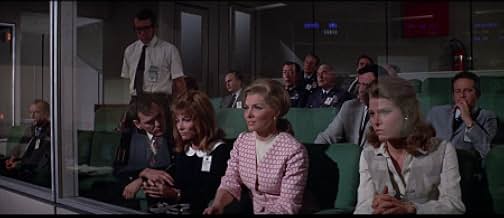Three American astronauts are stranded in space when their retros won't fire. Can they be rescued before their oxygen runs out?Three American astronauts are stranded in space when their retros won't fire. Can they be rescued before their oxygen runs out?Three American astronauts are stranded in space when their retros won't fire. Can they be rescued before their oxygen runs out?
- Won 1 Oscar
- 1 win & 3 nominations total
- Director
- Writers
- All cast & crew
- Production, box office & more at IMDbPro
Featured reviews
Sadly, 'bulk' is right when it comes to this movie: it's way overlong, with much of the length consisting of repetitive dialogue sequences or scenes which add little to the narrative. In some cases, it actually feels quite stodgy, especially during the lengthy mid section. I was often looking at the clock and wondering how much more of this I could sit through.
Invariably, the special effects are quite dated and often look laughable in this day and age. Yet despite these detractions, the film does have a special kind of timeliness to it (considering the year it was made) which adds significance to the production. And I'll admit that things do get quite thrilling in the last half hour, when we're treated to the kind of suspense that should have been present all the way through.
The actors are the main reason to tune in these days: it's hard to fault any of them, but I think Crenna gives the best performance of the lot as a compassionate family man. Hackman is almost unrecognisable in comparison to the later tough, mannered character actor he became, and as always Franciscus seems to me to be underrated. Peck is very good too, but then that's a given.
The film is a near-future sci-fi film in which a group of three astronauts are on a lengthy mission on a space station. On their return to Earth, there is an equipment malfunction and they are stranded in space. Unfortunately, there just doesn't appear to be a way to save them in time so the folks at NASA and on board the ship realize it's just a matter of time before they run out of oxygen.
As far as the acting goes, this was not one of Gregory Peck's finest moments. His character is very, very subdued and stern--too stern. As a result, he comes off as a grouch and a non-emotive one to boot. Fortunately, the astronauts (Richard Crenna, Gene Hackman and James Franciscus) all do an exceptional job and tend to give the film a lot more feeling. In particular, Franciscus is very good and manages to overshadow his more famous co-stars.
Other than Peck, the only other negative are some of the special effects. Most look very good for 1969, but the ones in 2001 seem to be a bit better. The film did get the Oscar for Best Special Effects, however, despite a few less than stellar scenes--though most the film's special effects were very effectively done.
As for the ending, it was very tense and worth seeing. So, for people who like this sort of film, it is excellent and gives insight into the fears people had during the days of the Apollo program.
I'm a pretty big sci-fi fan and especially love "speculative fiction;" meaning content about the near future that isn't necessarily out-of-this-world sci-fi. Authors like Philip K Dick and Jonathan Lethem excel in this genre, and I like Marooned fits in it very nicely.
Released in 1969, it obviously takes place at a not-much-later date - the inclusion of SKYLAB, launched in 1973, proves this. The rescue vehicle used also looks like a very crude version of the space shuttle - a futuristic test vehicle that looks grounded in reality enough to escape being campy. A few lines of dialogue also hint that a Mars expedition is something that is considered to be right around the corner.
Most complaints in the comments section refer to the pacing. All i can say is: go read a book. If 90-minute action fests are your barometer for the worth of a film, go elsewhere. There are no exploding fireballs or meteors ripping through space stations with stereotypical crazy Russians here. Instead, you get a fully realized and believable view into what might happen if some of our astronauts became stranded in space.
Personally, I was invested fully into the film and felt sad when the movie ended, the same way I feel when I finish a good book. The pacing here, if you are interested in the subject matter, is fine. For fans of science fiction, this movie is a must-see. For those of us who actually can sit through a book and enjoy it (and I don't mean "page-turners"), this movie is a great way to spend an afternoon. For everyone else, please avoid. You will only drag this movie's rating further into the mud.
Unless.
It's a slow movie, with Sturges taking his time (or his sweet time if you have no patience for this stuff) to build suspense and tension. Miles of film is expended detailing the boys at Mission Control and Kennedy trying to implement the "unless" I mentioned, a bold rescue mission that will arrive in the last moments of their O2, lifting off into the teeth of a hurricane, no less.
What makes the movie work are the very things that were lampooned so accurately by the boys at Mystery Science Theatre 3000, the terse acronym-filled jargon, the performances by Peck, Janssen, Crenna, Hackman, and Franciscus, and the glaringly non-CGI special effects (that looked great in 1970).
For a space-happy 11 year old, this was the ne plus ultra of movies--and the fact that the boys on the Apollo 13 had recently gotten back alive made Marooned more than a leetle beet unnerving in its topicality.
There's a moment that the movie transcends a clinical yawner, and takes on the mantle of heartbreakingly human drama. When the astronauts' wives are brought in to talk to them on small TV monitors, one after the other, and Nancy Kovack coldly tells the NASA suit "I know why we're here--we're here to say goodbye to them," you feel sucker-punched. It didn't seem real until right then.
Then the wives are warned that their husbands are "degraded," meaning they're tired, cold, and scared beyond description. Richard Crenna and Lee Grant have a touching exchange, the commander and his tough, beautiful, middle-aged wife trying to say everything to each other except goodbye. Kovack struggles with James Franciscus because her husband is the Spock of this mission, clinical and scientific. Yet he angrily assures her that they will make it. You can see him expending every bit of energy to convince her and himself that he's not a dead man orbiting.
Finally, Mariette Hartley tries to comfort Gene Hackman, who is bordering on hysteria and panic. She watches in a gut-wrenching horror as he reacts to her reading a letter the wives have written to the President. He cries and rages something like "I broke the lawn-mower, and I can't fix it and everyone is blaming me for it!" Hartley is hustled away, but she stops in dumb horror as she sees her husband on the big monitor in flight control, screaming "Don't kill me!" as Crenna and Franciscus hold him down to shoot him full of sedatives.
It's the most painful and human moment of the movie. Sturges has kept you on the edge of boredom, then wham, it's somehow all real. The movie goes from intellect to emotion in a matter of a few moments. I didn't appreciate this as an a tweenager, but God how my mouth went dry watching it a few days ago. These poor bastards are already in their titanium-shielded coffin!
The rest of the movie is predictable, but brutal in its denouement. You know that, if the men are to be saved, there's going to be some dues paid. I remember seeing Marooned at the Garland Theatre in Spokane in May, 1970. When those dues were paid, my mom was tearing up.
I thought, typical for a woman.
I was clearing my throat a lot and having trouble focusing on the screen when my family and I watched it over the weekend.
Adulthood has its upside, I guess.
Did you know
- TriviaIn the film, the astronauts are seen using what appears to be the early concept of the Manned Maneuvering Unit - during the real-life Skylab missions, the Astronaut Maneuvering Unit (the AMU) was tested inside the space station and never tested in the vacuum of space. The first use of the MMU was during STS-41-B (the fourth flight of the Challenger) on February 7, 1984.
- GoofsThe Mediterranean coastline as seen from orbit on several occasions barely resembles the correct geography. Spain is distorted and the Strait of Gibraltar is almost unrecognisable.
- Quotes
[Keith is pulled over by the Highway Patrol for speeding]
Charles Keith: Look, I've got to get to a telephone!
Texas DPS officer: Will you shut off your engine please?
Charles Keith: Officer, I'm Charles Keith, head of Manned Space!
Texas DPS officer: I know who you are. You have no brake lights. Your license is expired. You may be able to get to the moon, but mister you're a menace on the highway!
- Alternate versionsThe version titled "Space Travelers" is the one spoofed by Mystery Science Theater 3000. In this version, the scene where Celia Pruett learns of her husband's death is accompanied by a truly AWFUL electronic score (it sounds literally like random keys played on a toy synthesizer, something MST3K made note of). The original version has no music during this scene (and almost no other music; a muted, very low-key score can be heard when Pruett leaves the ship to "fix" it).
- ConnectionsEdited into Wonder Woman: Mind Stealers from Outer Space: Part 1 (1977)
- How long is Marooned?Powered by Alexa
Details
- Release date
- Country of origin
- Language
- Also known as
- Marooned
- Filming locations
- Cape Canaveral, Florida, USA(Second Unit Footage, Kennedy Space Center and Cape Canaveral Air Force Station)
- Production companies
- See more company credits at IMDbPro
Box office
- Budget
- $8,000,000 (estimated)
- Runtime
- 2h 14m(134 min)
- Color
- Aspect ratio
- 2.39 : 1


